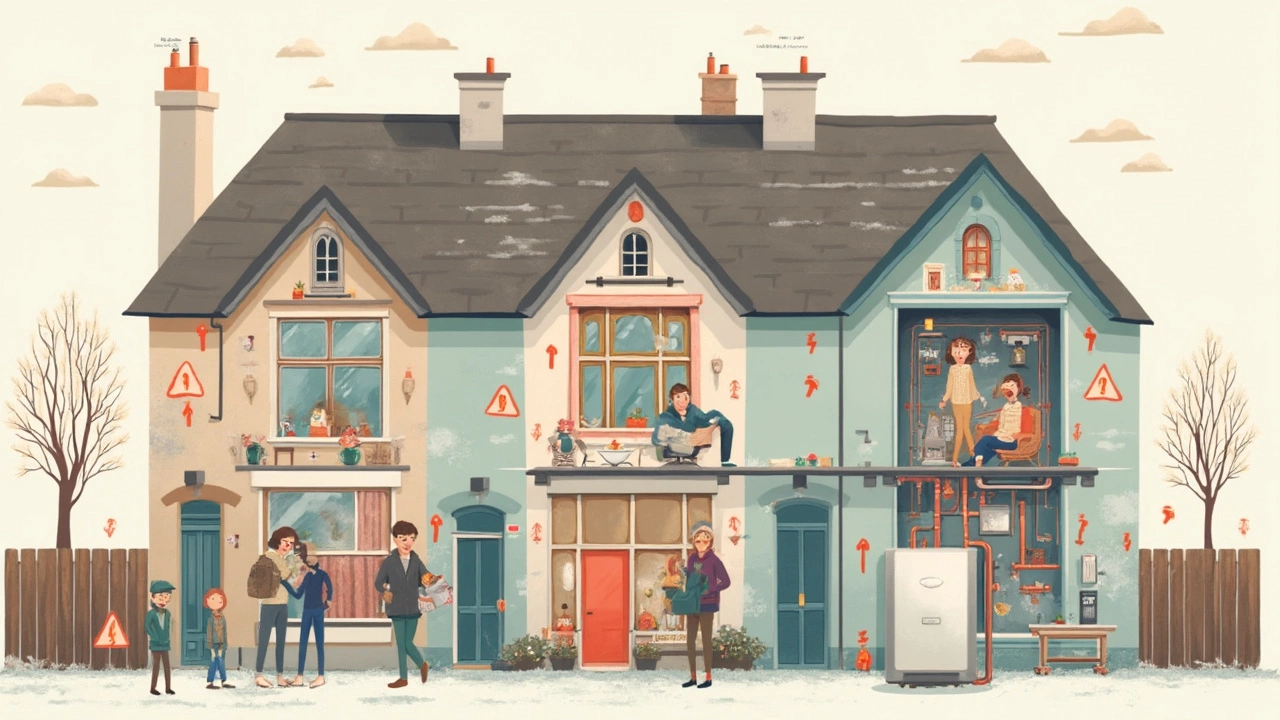So, your boiler's broken, and you're probably wondering how long you can stick it out before things get serious, right? With heating playing a crucial role in our comfort, especially during those chilly months, leaving a broken boiler unattended isn't exactly the best idea. You might manage for a short while, but the longer it sits in disrepair, the more you might pay later on, literally and figuratively.
If you're dealing with a minor issue, sure, you can use temporary fixes like space heaters or extra blankets. But if you're facing something bigger, like constant leaks or strange noises, it’s like ignoring a small toothache—it often gets worse. Plus, it's not just about the warmth; a malfunctioning boiler can sometimes be a safety issue too.
- Why Boilers Break Down
- Warning Signs of Bigger Issues
- How to Keep Warm Without a Boiler
- When to Call in the Pros
- How Long Repairs Typically Take
- Future-Proofing Your Boiler
Why Boilers Break Down
Alright, so you're curious why boilers sometimes decide to throw in the towel. First off, don't beat yourself up—boiler breakdowns are pretty common, and they happen for a bunch of reasons. Knowing what causes these issues can help you spot trouble early on and save you a ton of stress later.
One of the main culprits is wear and tear. Boilers, just like any other appliance, have moving parts and seals that wear down over time. If you've got an older model, expect this to be more of a headache. Another biggie is lack of regular maintenance. Skipping that annual service? That could be setting yourself up for a breakdown during winter.
Then we've got pressure problems. Your boiler needs the right pressure to work efficiently. Too low or too high can cause it to shut down. Mineral build-up from hard water can also cause blockages inside the system, leading to overheating or even total failure.
Dave Whitby from HeatWave Experts once said, "
Most boiler breakdowns could be avoided with regular check-ups and proper care; it’s a lot like giving your car regular services to keep it running smoothly." Pretty spot on, right? Keeping an eye on things really does make a huge difference.
Let's not forget about the impact of thermostat issues. If your thermostat is on the fritz, it might just be sending the wrong signals to your boiler. This can make the system cycle on and off incorrectly, wearing it out faster.
One sneaky problem is airlocks. Air pockets can block hot water from circulating through your heating system. if your radiator isn't getting hot at all, this might be what's going on.
So, while boilers are built to last, these issues can creep up if you’re not vigilant. The best bet? Regular check-ups and addressing minor problems before they balloon into something bigger. Trust me, taking these steps will save you a bundle and keep your home cozy.
Warning Signs of Bigger Issues
So, you're thinking your broken boiler might just be a minor hiccup? Well, hold up. Sometimes those tiny annoyances are really just clues to a bigger, more serious problem. Ignoring what seems small may lead to hefty repair bills or—yikes—putting your family at risk.
First off, if you're hearing weird noises like banging or whistling from the boiler, that's usually a red flag. These sounds often mean there's a build-up of limescale or, worse, that a part might be on its last legs. And trust me, these noises won't go away on their own.
Let's talk leaks next. If you notice water pooling or dripping from your boiler, don’t shrug it off. Leaks can quickly turn serious, leading to water damage and higher energy bills, not to mention it's a solid sign that something inside needs fixing ASAP.
What about the trusty radiator? If it’s being a diva—cold spots everywhere or refusing to heat up at all—it usually means trouble with the circulation in your heating system. This problem doesn’t just affect comfort but can also stress the boiler more, leading to further issues.
Oh, and don’t ignore the control panel. If it's flashing error codes like it’s trying to send you some secret message, it's time to listen. These codes often point directly to a specific problem in the system that needs a pro's touch quickly.
Here's a small breakdown to keep these signs in check:
- Noisy boiler – Possible component wear or limescale build-up
- Leaks around the boiler – Potential internal part failure or excessive pressure
- Radiators with cold spots – Circulation issues or blocked pipes
- Error codes on control panel – Specific mechanical or electronic faults
By catching these heating problems early, you might save yourself from bigger headaches and, more importantly, from living too long without proper heating. Nobody wants to spend winter with nothing but wool socks and hot cocoa to keep warm!
How to Keep Warm Without a Boiler
So, your boiler's gone kaput, and you need to find ways to stay warm. It's not the ideal situation, but you can survive without central heating, at least for a little while. Here are some practical tips that might just save your chilly toes.
First up, layer up with clothing. It sounds simple, but wearing multiple layers traps heat, keeping you warmer than a single thick jacket would. Go for thermal undergarments if you have them—they're like a secret weapon against the cold.
- Space Heaters: These little devices can be a lifesaver. Just make sure to use them safely, and don't leave them on all night or when you're out.
- Insulate Your Home: Seal off rooms you're not using to stop heat from escaping. Heavy curtains can also help retain warmth, acting as an extra barrier against drafts.
- Hot Water Bottles: These are not just for grandma. Toss one under your blankets, and you're good to go.
- Cook Something Warm: Baking or using your stove not only fills your belly but also adds warmth to your kitchen.
If you're stuck for a few days, consider inviting folks over. Extra bodies mean extra warmth—mother nature's little heating system. Just don't forget to offer some cozy drinks!
Finally, here’s a little reminder: make sure you’ve got some working fire alarms and maybe a carbon monoxide detector if you’re using alternative heating methods. Staying warm is great, but staying safe is even better.

When to Call in the Pros
So, you're in the trenches with a broken boiler, and you're weighing up whether to bring in a professional. There comes a point where going solo just won't cut it. Here’s when to reach for that phone and call a pro.
First off, if your boiler has stopped working entirely, you need expert help. A complete shutdown can stem from serious issues like electrical faults or a malfunctioning pilot light that's beyond a quick DIY fix. Don’t mess around with these—it’s a job for the pros.
Another clear sign you need to call in an expert is if you smell gas or notice a constant rise in your household gas usage without explanation. Not only can this indicate a potentially dangerous leak, but it also usually means your boiler repair needs are urgent.
If you’re hearing banging, whistling, or gurgling sounds coming from the boiler, that’s another red flag. These noises often relate to problems like air in the system or low water pressure, which a professional is trained to handle safely and efficiently.
- Leaks: Finding puddles or persistent dampness under the boiler means you probably have a faulty pressure valve or pump. Time to call a pro.
- Inconsistent heating: If certain areas of your home are warm while others are freezing, it could be due to sludge or debris in your system obstructing flow.
- Fading Pilot Light: If your boiler's pilot light keeps going out, it might be a thermocouple issue that requires a professional’s expertise.
Remember, attempting a fix yourself can sometimes void warranties or cause further damage, both of which can end up costing more in the long run. Most professional services are equipped to diagnose and remedy issues quickly, often saving you from more extensive home maintenance headaches.
For some peace of mind, many professionals offer annual maintenance plans to keep systems in peak condition. These checks can often catch small issues before they grow into costly repairs.
How Long Repairs Typically Take
Okay, let’s get into it. You've decided that living with a broken boiler isn’t cutting it anymore, and it’s time to fix it. But you're probably wondering, how long is this going to take, right? The answer really depends on what’s wrong with your boiler.
For a start, something simple like a pressure drop or thermostat issue can usually be sorted in a quick afternoon visit, lasting about 1 to 2 hours. Easy peasy. However, if you’re looking at something more serious, like replacing the heat exchanger or dealing with a severe leak, you might be looking at a couple of days.
Now, here's where the proverbial can of worms opens: part availability. If your boiler is an older model, or if parts are out of stock, that could tack on extra time, sometimes a week or more.
Might also be good to know that during the peak winter months, there's a chance service call wait times could extend as issues pile up for repair folks. Consider reaching out earlier in the fall to avoid these longer waits.
For a quick rundown of typical repair times based on the issue, check out this handy glimpse:
| Issue | Estimated Time |
|---|---|
| Pressure Drop or Thermostat Problem | 1-2 hours |
| Minor Leak Fix | 2-3 hours |
| Circulation Issue | Half a day |
| Heat Exchanger Replacement | 1-3 days |
No matter the timeline, regular maintenance can cut down on the necessity of these repairs and keep things running smoother for longer. So, while waiting might be inevitable sometimes, a little prevention can offset a lot of headache down the line.
Future-Proofing Your Boiler
Let's be honest, dealing with a broken boiler once is more than enough for a lifetime. To avoid facing that hassle repeatedly, it's crucial to think ahead and plan for the future. Here are some practical tips to make sure your boiler doesn't keep letting you down.
First off, regular maintenance is your best friend. Scheduling an annual check-up with a professional can seriously stretch the lifespan of your boiler. They can spot minor issues before they turn into major headaches, saving you both time and money.
Next, consider installing a system upgrade. Boilers, like all tech, improve with each new generation. Modern models are more efficient and come with smart features that not only improve performance but also save energy. You'll get better heat distribution and cut down on those nasty utility bills.
Keeping your boiler's surrounding area clear is another super simple yet often overlooked step. Obstructions can trap heat and force the boiler to work harder than it needs to, shortening its lifespan.
Lastly, you might want to monitor your boiler's energy usage and efficiency. Keeping track of your utility bills can give you clues if your boiler starts becoming less efficient. Sudden spikes in your heating bill could mean it's struggling, and it might be time to consider an energy audit.
Here's a quick rundown of what you can do:
- Schedule annual maintenance and checks with qualified engineers.
- Consider a system upgrade if your boiler is older than 15 years.
- Keep the boiler area clutter-free to prevent overheating.
- Monitor your energy usage to spot inefficiencies early.
By taking these steps, you're not just future-proofing your system. You're making sure that those winter nights stay cozy and your home remains free from the stress of unexpected heating problems.


